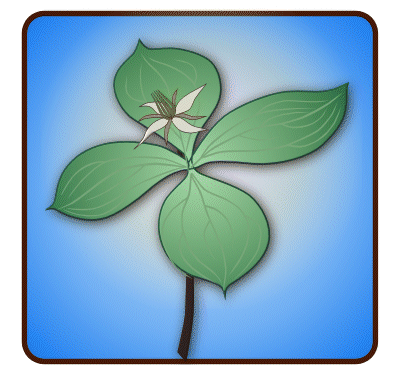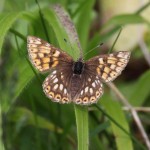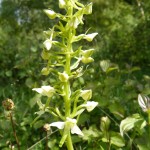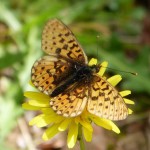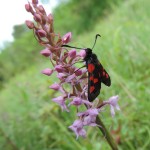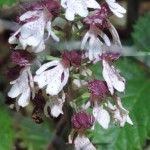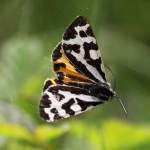Stuart Corbett, the Conservation Officer of Dstl Porton Down, kindly gave up his Sunday to escort members round the site on 1st June, a day of warm sunshine. On the way to the first stopping point, a small herd of Fallow Deer raced across the road in front of the coach. The group emerged onto superb chalk grassland, with Fragrant and Common-spotted Orchids, Yellow-wort, Common and Chalk Milkwort, Dingy and Grizzled Skippers, Common Blue and Brown Argus butterflies and Mother Shipton and Burnet Companion moths. There was also a large patch of Horseshoe Vetch under the back of the coach. Looking back along the road, a Peregrine was perched on top of a tall target building. After a brief pause to enjoy the richness of the flowers and insects, the party headed down a side track into the woods. Flowering White Helleborines, Bird’s-nest Orchids and the leaves of Broad-leaved Helleborines were amongst the finds here. A female Brimstone was watched as she laid an egg on a Buckthorn leaf.
A sheltered area of rich chalk grassland opened up on one side of the track and proved to be a particularly productive site for insect sightings. Tiny metallic green Forester moths of some variety, probably Cistus Forester, were seen in good numbers. There were many Burnet moths with 5 spots. The conjoined spots on a few individuals and the early date indicated that they may have been Five-spot Burnet, Zygaena trifolii ssp palustrella, a subspecies found on chalk, rather than the generally commoner Narrow-bordered Five-spot Burnet Zygaena lonicerae. A cream pyralid moth which initially puzzled the experts was later confirmed as Paratalanta pandalis. Also seen were striking Wood Tiger moths, tiny Small Purple-barred moths and Green Hairstreak butterflies. There were many small Summer Chafer beetles, which according to Stuart, form an important component of the Stone Curlew diet. The walk continued along the track, back into open scrubby woodland. Stinking Hellebore, Greater Butterfly-orchid and Deadly Nightshade were amongst the finds here. Turning aside into a clearing with abundant Primrose plants, several Duke of Burgundy butterflies were an exciting find. On the return walk, 2 slightly warn Pearl-bordered Fritillary butterflies flew along the track,
After a picnic lunch near the coach, the group continued along the road which ran along the top of the ridge. Stuart stopped next to a female Juniper bush to outline the recent history of Juniper at Porton Down. There has been no significant regeneration since myxomatosis reduced the rabbit population and the youngest bushes are nearly 50 years old now. The valley below, known as ‘The Brecks’, used to be covered in lichen, but is slowly reverting to grassland. It was once ploughed, using 2 traction engines and a steel cable to drag a plough to and fro. Although crops were grown for a short while, the soil was too poor for sustained arable farming. The farmer then bred rabbits for a while, which further depleted the soil and allowed the lichens to become dominant. Two Foxes were seen in the distance. A sharp-eyed member of the group spotted a Stone Curlews on the short turf of the valley below. Then a second Stone Curlew was spotted nearby. Continuing along the track, there were many ant-hills, covered in plants such as Wild Thyme, Heath Speedwell and Common Rock-rose. An Oblique-striped moth was another chalk downland speciality. The route then led into woodland, with abundant Common Twayblades and Common Spotted-orchids beside the path. Down a side path was a stunning Lady Orchid in full flower, with a number of leaf rosettes of smaller plants nearby. A flowering Common Spotted-orchid was an unexpected sighting above head-height in the fork of an adjacent Beech tree.
Pictures by Ricki Bull, Ian Esland and Rob Stallard
| Porton Down plant list 01-06-2014 | |
| Scientific Name | Common Name |
| Gymnadenia conopsea | Fragrant Orchid |
| Sanguisorba minor | Salad Burnet |
| Linum catharticum | Fairy Flax |
| Polygala vulgaris | Common Milkwort |
| Ranunculus bulbosus | Bulbous Buttercup |
| Polygala calcarea | Chalk Milkwort |
| Cirsium acaule | Dwarf Thistle |
| Hippocrepis comosa | Horseshoe Vetch |
| Plantago lanceolata | Ribwort Plantain |
| Carex flacca | Glaucous Sedge |
| Thymus polytrichus | Wild Thyme |
| Dactylus glomerata | Cock’s-foot |
| Reseda lutea | Wild Mignonette |
| Brachypodium pinnatum | Tor-grass |
| Erodium cicutarium | Common Stork’s-bill |
| Bellis perennis | Daisy |
| Veronica chamaedrys | Germander Speedwell |
| Cerastium fontanum | Common Mouse-ear |
| Blackstonia perfoliata | Yellow-wort |
| Viola hirta | Hairy Violet |
| Dactylorhiza fuchsii | Common Spotted-orchid |
| Galium album | Upright Hedge-bedstraw |
| Eupatorium cannabinum | Hemp-agrimony |
| Pilosella officinarum | Mouse-ear Hawkweed |
| Hypericum perforatum | Perforate St John’s-wort |
| Trifolium dubium | Lesser Trefoil |
| Lotus corniculatus | Common Bird’s-foot-trefoil |
| Quercus cerris | Turkey Oak |
| Briza media | Quaking-grass |
| Hypochaeris radicata | Cat’s-ear |
| Leucanthemum vulgare | Oxeye Daisy |
| Avenula pratense | Meadow Oat-grass |
| Poa pratensis | Smooth Meadow-grass |
| Holcus lanatus | Yorkshire-fog |
| Festuca ovina | Sheep’s-fescue |
| Arrhenatherum elatius | False Oat-grass |
| Potentilla anserina | Silverweed |
| Centaurea scabiosa | Greater Knapweed |
| Fragaria vesca | Wild Strawberry |
| Hypericum hirsutum | Hairy St John’s-wort |
| Myosotis arvensis | Field Forget-me-not |
| Cirsium arvense | Creeping Thistle |
| Origanum vulgare | Marjoram |
| Rhamnus cathartica | Buckthorn |
| Primula vulgaris | Primrose |
| Epipactis helleborine | Broad-leaved Helleborine |
| Helianthemum nummularium | Common Rock-rose |
| Veronica officinalis | Heath Speedwell |
| Rumex acetosa | Common Sorrel |
| Galium verum | Lady’s Bedstraw |
| Cephalanthera damasonium | White Helleborine |
| Neottia ovata | Common Twayblade |
| Cornus sanguinea | Dogwood |
| Agrimonia eupatoria | Agrimony |
| Plathanthera chlorantha | Greater Butterfly-orchid |
| Sanicula europaea | Sanicle |
| Mercurialis perennis | Dog’s Mercury |
| Aquilegia vulgaris | Columbine |
| Helleborus foetidus | Stinking Hellebore |
| Atropa belladonna | Deadly Nightshade |
| Potentilla reptans | Creeping Cinquefoil |
| Neottia nidus-avis | Bird’s-nest Orchid |
| Veronica arvensis | Wall Speedwell |
| Clematis vitalba | Traveller’s-joy |
| Galium aparine | Cleavers |
| Anthyllis vulneraria | Kidney Vetch |
| Juniperus communis | Juniper |
| Cirsium vulgare | Spear Thistle |
| Cirsium eriophorum | Woolly Thistle |
| Vicia sativa | Common Vetch |
| Aphanes arvensis | Parsley-piert |
| Echium vulgare | Viper’s-bugloss |
| Anagallis arvensis | Scarlet Pimpernel |
| Verbascum thapsus | Great Mullein |
| Geranium molle | Dove’s-foot Crane’s-bill |
| Sedum acre | Biting Stonecrop |
| Catapodium rigidum | Fern-grass |
| Carlina vulgaris | Carline Thistle |
| Rubus fruticosus agg. | Bramble |
| Viola riviniana | Common Dog-violet |
| Orchis purpurea | Lady Orchid |
| Plantago media | Hoary Plantain |
| Birds | |
| Falco peregrinus | Peregrine Falcon |
| Burhinus oedicnemus | Stone Curlew |
| Picus viridis | Green Woodpecker |
| Sylvia borin | Garden Warbler |
| Sylvia atricapilla | Blackcap |
| Mammals | |
| Vulpes vulpes | Fox |
| Dama dama | Fallow Deer |
| Butterflies | |
| Ochlodes sylvanus | Large Skipper |
| Erynnis tages | Dingy Skipper |
| Pyrgus malvae | Grizzled Skipper |
| Gonepteryx rhamni | Brimstone |
| Callophrys rubi | Green Hairstreak |
| Cupido minimus | Small Blue |
| Aricia agestis | Brown Argus |
| Polyommatus icarus | Common Blue |
| Hamearis lucina | Duke of Burgundy |
| Boloria euphrosyne | Pearl-bordered Fritillary |
| Pararge aegeria | Speckled Wood |
| Coenonympha pamphilus | Small Heath |
| Moths | |
| Adscita agg. | Forester agg. |
| Five-spot Burnet agg. | |
| Crambus perlellus | |
| Scoparia pyralella | |
| Pyrausta purpuralis | |
| Pyrausta nigrata | |
| Paratalanta pandalis | |
| Phibalapteryx virgata | Oblique Striped |
| Epirrhoe alternata | Common Carpet |
| Parasemia plantaginis | Wood Tiger |
| Tyria jacobaeae | Cinnabar |
| Callistege mi | Mother Shipton |
| Euclidia glyphica | Burnet Companion |
| Autographa gamma | Silver Y |
| Phytometra viridaria | Small Purple-barred |
| Other Insects | |
| Amphimallon solstitialis | Summer Chafer |
| Timarcha tenebricosa | Bloody-nosed Beetle |
Lists by Renée Grayer, Norman Hall and Jan Haseler
